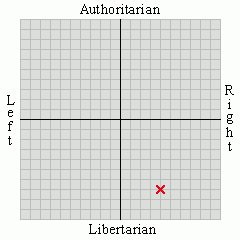At one point I told will that I like the idea of anarchy as an ideal but feel that it's probably not practical, although stable is a better word, except in small groups. I can imagine it working on a small Pacific Island, for example. will may have been thinking I meant communitarian type small groups but I wasn't, or at least not necessarily. My thought was simply that the larger the number of people involved the greater the chance one or more will be able and willing to move to dominate the rest, and when that happens you've basically got another state being born. This is one of my objections to anarchy, though again objection may not be quite the right word, and I don't think we'll ever get to a point where it can't possibly happen. Scale certainly should not be a problem but I feel human nature will always make it so simply because the chances it will happen seem likely to be proportional to the number of people. When you're talking millions of people it's practically a certainty. I realise that the whole point of a functioning anarchy is that there would be spontaneous resistance but I don't think we're yet at the point where people would automatically resist as an anarchy would. It's hard enough trying to persuade people that voting for the same big political parties is a recipe for the same crap we have to put up with from the bastards - to persuade them, especially the millions and millions who've become conditioned to dependence on states, to make the change to an anarchy seems virtually impossible. As the saying goes, you can't get there from here. But perhaps minarchy you can.
will also points out, and accepts as a possible plus point for minarchy, that there's the issue of defending against other states. For instance, would it be possible for the people of a stateless and more or less anarchic Australia to resist invasion from a state that wishes to claim the land and its resources for its own? Indigenous Australians might well point out that this was in fact tested a couple of hundred years ago and the answer was no. The population was and still is spread thinly into small clusters that can't easily support each other. They're much bigger today of course, both in absolute and relative terms, but there are some very populous nations to the north of here so if ever there were hostilities with one of them the situation mightn't be so different. In the 18th Century what was needed was enough numbers in the right place to see off a relative few invaders with superior weapons, but this huge country was populated by a few hundred thousand in small tribal groups. In the modern age we have cities with millions of inhabitants, but still only a few of them and a lot of space in between, so what's needed is big ticket technology and a professional military which knows how to use it. Even if each town and city suburb was a free society armed to the teeth and able to resist aggression coming down the street, how many people would buy the multi-million dollar stuff needed to offer resistance to an invasion on the far side of the country? Who would defend the bits in between the cities? It would be in our interests in Melbourne that Darwin can defend itself and be helped if needed, and then anyone who knocked it down and began marching here could be bombed to buggery every inch of the four thousand kilometres they'd have to come, but even with the extra personal wealth a stateless society ought to mean how many people would buy an F/A-18 on the off chance it was necessary?
The nightwatchman state, or as I prefer to think of it, federal government in a big glass case with "Break in Case of Emergency" stencilled across it, seems like a minimum requirement for Australia. But as a libertarian I think it should also be about the maximum at federal level, and with such limited scope I feel it should be able to manage on voluntary taxation of some kind. The back of a handy envelope suggests that as things are now GST (the Aussie VAT, but at 10%), if it became a federal tax, would allow about a sixfold increase in defence spending if Canberra had nothing else to spend money on. For a lot less than that they could probably double salaries, increase numbers and have more and cleverer toys to play with, so both the rate and scope of GST could probably be reduced. The states and territories, probably even the towns and cities in them, could be left to their own devices and form whatever form of local society and government their inhabitants want. Queensland could be very strongly socialist and New South Wales very free market, or intra-state Melbourne might go socialist, Geelong free market, and Bendigo outright An-Cap. I have no objection to a city of 5 million socialists giving money to their government for it to waste if it pleases them to do so as long as there was somewhere I could go that where I wouldn't be forced to join in. The system that worked best would soon become apparent as it would be the best off and attract the most citizens, while the federal government would restrict itself to maintaining the nation's borders, defending the people within them with a force also available to call on in disasters, and maybe throwing the odd party to keep up relations with other nations. I don't think we should mind springing for the occasional pack of Ferrero-Rocher, although other foreign ambassadors and heads of state might ask about the new look to Canberra's skyline.
Yes, all that seems nearly as far away as anarchy, doesn't it? But Australia is already a federation of competing states, at least in theory, and others exist. They’d seem like a good place to do it if the people of one of them can get the federal government to act like a guard dog instead of a wolf - they look about the same but one gets fed and the other steals your sheep. Arguably the US tried to limit government in a similar way and ultimately failed, and will did suggest something very like that, but I feel that could just mean the technique still needs refinement. It doesn't mean the idea is a no-hoper. They did a better job with their Bill of Rights than the 1688 version did for England, which in turn was an improvement on the status quo ante. Imagine what the same people who wrote it might come up with now if they had the benefit of our two centuries of hindsight. They might have reduced the first Ten Amendments down to just one, a Zeroth Amendment if you like. Perhaps it might have read something like this:
No wordy justifications that can be picked over and reinterpreted by future jurists, just a simple statement of facts. Constrained by that and supported only by voluntary taxation a federal government might well end up being the nation's guard dog after all. And people can grow to value their guard dogs, can't they?



















